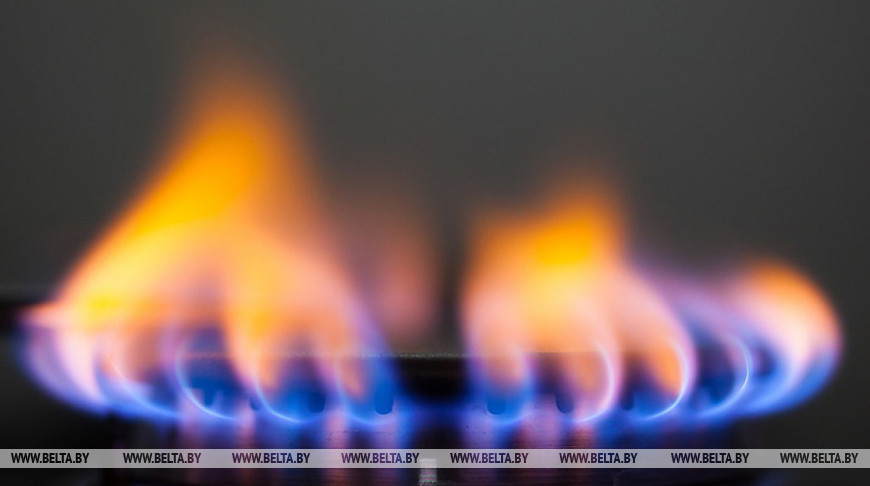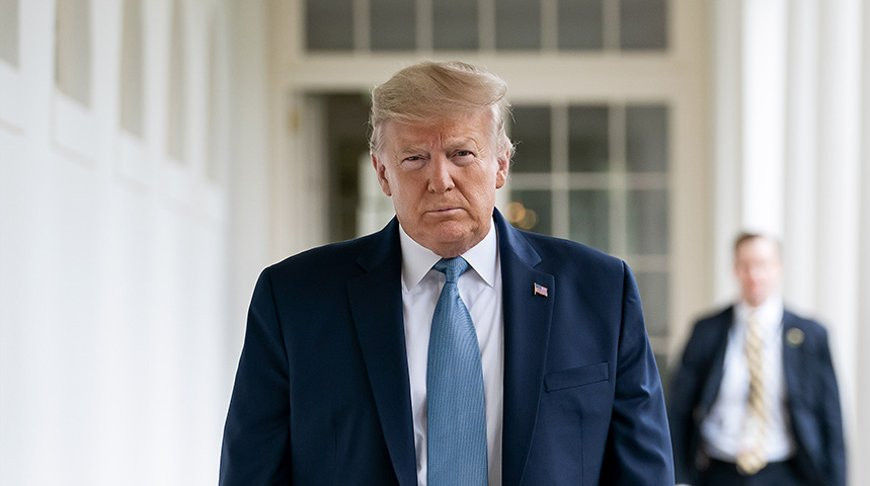
But no matter how much Trump “undoes” Biden's initiatives, he may well adopt one of his predecessor's tricks. Three years ago, Washington succeeded in encouraging Europeans to buy expensive U.S. LNG instead of cheap pipeline gas from Russia. In terms of common sense it is impossible to explain how the European elites fell for this trick. But judging by recent events, we should expect a repeat of this virtuoso scenario soon. This time it will be directed by the Trump team.
EU gas drift
Replacing Russian gas with U.S. gas on the European market has been the idea from the get-go. During his European tour in March 2022, Biden said that Europe should get rid of its energy dependence on Russia, and Washington was ready to help.
The Americans did help. First, with LNG, which was many times more expensive for Europeans than for U.S. producers. And then with the Inflation Reduction Act, the purpose of which was to lure European manufacturers to the U.S. due to more comfortable business conditions and to bring Europe to deindustrialization. To consolidate the result, the gas “umbilical cord” was cut as the Nord Stream was blown off.
Having got rid of Russia's dependence on energy,
Europe immediately fell into dependence on the United States. Except that when
buying gas from Russia, the EU economies were growing. Having reoriented to
U.S. LNG, Europe faced an energy crisis, decreased competitiveness and
bankruptcy of its flagship enterprises.  Making a real mess of things, having ruined their
economies, the European elites have slowly begun to drift back to Russian
dependence in the gas issue. In 2024, Russia became the second largest gas
supplier to the EU. Norway took the first place. According to the European
analytical center Bruegel, EU countries increased their purchases of Russian
LNG by 21% last year. Pipeline gas exports from Russia to Europe rose by 14%.
At the same time, almost half of the supplies (15.4 billion cubic meters) was
transited through Ukraine.
Making a real mess of things, having ruined their
economies, the European elites have slowly begun to drift back to Russian
dependence in the gas issue. In 2024, Russia became the second largest gas
supplier to the EU. Norway took the first place. According to the European
analytical center Bruegel, EU countries increased their purchases of Russian
LNG by 21% last year. Pipeline gas exports from Russia to Europe rose by 14%.
At the same time, almost half of the supplies (15.4 billion cubic meters) was
transited through Ukraine.
It is noteworthy that the United Stated reduced LNG supplies to the EU by 18% at the end of last year. Thus, it dropped to third place in the list of the largest gas suppliers to Europe.
Trump's economic asset
However, such statistics correlate poorly with Trump's stated plans. The U.S. president-elect intends to ramp up oil and gas production and, accordingly, to increase exports.
Back in December, Trump made Day One promises that he intends to implement upon taking office. The moves aim to overturn some of the key energy policies put into place by the Biden administration.
“I will sign Day One orders to end all Biden
restrictions on energy production, terminate his insane electric vehicle
mandate, cancel his natural gas export ban, reopen ANWR in Alaska — the biggest
site, potentially anywhere in the world — and declare a national energy
emergency,” Trump said. 
It is worth noting that certain steps in this direction are already being taken. It became known the other day that the U.S. state of Alaska filed a lawsuit against the Biden administration in connection with the ban on the development of oil and gas fields in an area that spans about 625 million acres.
This week, Trump slammed Biden’s decision to block oil drilling across large swaths of the U.S.’s coastlines "Look, it’s ridiculous. I’ll unban it immediately,” he said. "We can't let that happen to our country. It's really our greatest economic asset," Trump added.
There is no doubt that Trump will try to deliver on his promise to reverse Biden’s decision. The Republican had repeatedly made it clear before that he cared little about environmental issues, and also ridiculed climate change concerns. But extraction is only half the trouble. Raw materials need to be sold at a profit. However, Trump seems to have already made up his mind on this issue.
Tariffs all the way
At the end of December the Republican openly declared his intention to get Europe hooked on the American LNG needle again - not voluntarily, but by force. Trump gave the European Union an ultimatum: either Europe increases its purchases of oil and gas from the United States, or Washington declares a tariff war on Brussels.
“I told the European Union that they must make up their tremendous deficit with the United States by the large scale purchase of our oil and gas. Otherwise, it is TARIFFS all the way!!!” Trump said.
In response to this, the European Parliament threatened to impose additional taxes on tech companies from the United States. "American tech giants earn a lot of money in the EU and barely pay taxes. This could certainly be a starting point," Manfred Weber, the leader of the European People's Party in the European Parliament, said last week.
He believes that Brussels should take seriously Trump’s threats to introduce 20% duties on European products. According to Weber, the European Union needs to brace up for such a scenario.
Executive Vice-President of the European Commission Stéphane Séjourné also pushed back at Trump. "I am ready to discuss with my colleagues both defensive and offensive strategies," Séjourné said speaking about the EU's possible retaliatory measures.
But while Brussels is contemplating retaliatory steps, and measures to protect the domestic market are reduced to the words "probably" and "could be", the situation continues to get worse for the European Union. The offensive promised by Séjourné is already in full swing. However, their offensive is directed at Europe.
"Zelensky's sabotage"
As mentioned above, in 2024 almost half of pipeline gas going from Russia to Europe passed through the territory of Ukraine. In 2025, this will no longer be the case.
Transit through Ukraine was completely discontinued on 1 January. Kiev refused to extend the contract for gas transportation, and Russia's Gazprom stopped supplying fuel through the Ukrainian gas transportation network. From an economic point of view, the decision to stop transit is irrational. It will not benefit either Russia, or Ukraine, or Europe.

According to Bloomberg estimates, Russia will be able to handle the discontinuation of transit easier than others, losing no more than 0.2-0.3% of GDP. "Moscow already has alternative fuel supply options to shield it from serious economic damage. Russia plans to expand exports of liquefied natural gas, while simultaneously pumping gas to other buyers, such as China," the agency noted.
Meanwhile, Ukraine, which has refused to earn money from transit, is already preparing for an increase in prices for “everything”. According to the Ukrainian newspaper Strana, the first and the most obvious effect of the halted gas supplies is an increase in gas prices for both households and businesses. Soon entrepreneurs will start to shift the growth of production costs to consumers. Experts predict that in the next six months prices for many products, including food, may rise by 10-20%. Another problem is maintaining pressure in the pipelines. If it is not solved, there will be interruptions in gas supply to some regions of Ukraine.
As for Europe, there are different assessments. Austria, Slovakia, Italy, the Czech Republic and Moldova will be most affected by the stoppage of transit. Instead of pipeline gas, they will have to buy liquefied gas which is higher in price. The most acute reaction was produced by Slovakia. The country's Prime Minister Robert Fico described the transit halt as “sabotage by Zelensky” and threatened Kiev with retaliatory measures.
The situation in Moldova is complicated and almost a stalemate in unrecognized Transnistria. Russian gas supplies were stopped there because of the termination of transit through Ukraine, as well as Moldova’s refusal to pay debts for gas to Gazprom. While Moldova has alternative sources of gas and electricity, Transnistria has no possibility to import energy resources.
Now Transnistria is trying to survive through the Cuciurgan power station, but the coal reserves at the plant will be sufficient until mid-February at the most. Central heating has already been cut off in the region, the supply of hot water has been stopped, and there are power cuts. All industrial enterprises are standing still. What is happening in Transnistria today is no longer an energy crisis, but a humanitarian crisis. In an attempt to keep warm, people are putting their lives in danger. There have been reports of deaths among the population due to carbon monoxide poisoning.
With the halt of gas transit through Ukraine, Germany has also sounded the alarm. Steffen Kotre, a member of the Bundestag from the Alternative for Germany party faction and a member of the parliamentary energy committee, told TASS that stopping the transit of Russian gas through Ukraine would aggravate the energy crisis in Europe and further increase energy prices. This jeopardizes the security of supplies to European countries and increases Europe's dependence on expensive imports of liquefied natural gas. Berlin also recalled the preserved string of the Nord Stream 2 pipeline. According to Bundestag member Sevim Dagdelen, the German authorities should re-launch Nord Stream.
However, the German authorities see no cause for worries. They only recommend the population to continue saving gas in order to “reduce the burden on their own wallets”.
The European Commission is also full of optimists. They assure that the EU will cope with the stoppage of Russian gas transit through Ukraine. They say that Europe's gas infrastructure is quite flexible, which makes it possible to organize deliveries of fuel of non-Russian origin via other routes. Brussels is not embarrassed by the price of the issue.
The European Commission has not noticed gas price hikes either. “We have not seen price hikes in the new year, the market remains stable,” European Commission spokesperson Anna-Kaisa Itkonen said this week. It is worth noting that just this week exchange prices for gas in Europe rose above $510 per 1,000 cubic meters. At the same time in 2024 the average price for natural gas in Europe was about $387 per 1,000 cubic meters.
Terms accepted
The actions by the European Commission, or rather the lack of action, give the impression that Brussels has already accepted Trump's terms. When European officials talk about buying “fuel of non-Russian origin”, they most likely mean U.S. LNG. Eventually, it is European consumers who will have to foot the bill.
The only person who is still trying to get through to Brussels is Slovak Prime Minister Robert Fico. Budapest supports him, although it is more out of solidarity. After all, Hungary receives the bulk of Russian gas through the TurkStream pipeline, so they will be less affected by the termination of transit through Ukraine.
This week, the Slovak government has proposed holding a meeting between representatives of European Commission and Ukraine to discuss the gas issue. However, Kiev ignored the invitation. Brussels, which sponsors Ukraine and, consequently, has influence over the Ukrainian authorities, did not support Slovakia, choosing to keep silent.
However, Poland, which currently holds the EU presidency, voiced its opinion. But this does not prevent it from remaining the main guardian of U.S. interests in Europe. On 7 January, when the Slovaks made an unsuccessful attempt to discuss gas problems, Warsaw issued a statement saying that it was ready to increase electricity supplies to Ukraine. It is worth noting that earlier Fico threatened to stop electricity exports to Ukraine in response to the termination of gas transit. In this context, Warsaw's statement could be seen as a gesture of support and endorsement of Kiev's actions.
The main beneficiary of the current situation, the United States, has also openly supported the Ukrainian leadership. White House National Security Communications Advisor John Kirby said the other day that Washington is working tirelessly, together with its European partners, to expand diversification opportunities.
Obviously, in his book, diversification means the U.S. LNG monopoly. The White House official has his own statistics. He stated that currently, 50% of European LNG imports come from the United States. According to Kirby, this “diversification” should be expanded, probably to the absolute monopoly.
In fact, Kirby's statements are similar to those of Trump. The only difference is in the way of presentation. The strategic interests of the United States have not changed. Dominating the European gas market remains one of the U.S. key interests. It is not only about replenishing the budget by selling LNG to Europeans. It is about the desire to prevent closer economic ties between the EU and Russia.
Therefore, it can be assumed that the United States under Trump will continue to “drill” and undermine the economies of both its partners and adversaries. It will follow the "divide and conquer" principle. As they say, nothing personal, just business.
Vita KHANATAEVA
Photos courtesy of 45office.com, RIA Novosti
BelTA













